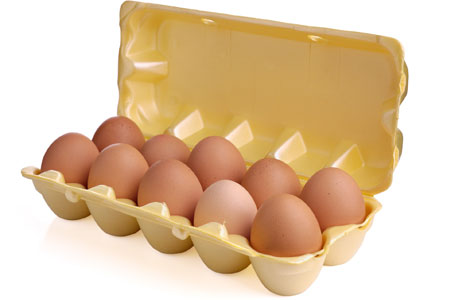
As a chicken keeper, you may sometimes have more eggs than you can use, while at other times you have too few. Logically you’d want to preserve surplus eggs in times of plenty to use in times of need.
By far the safest way to store eggs long-term is in a refrigerator. Save only eggs with uncracked, clean shells. Washing or dry buffing dirty eggs reduces their ability to keep well under prolonged storage. Also candle the eggs and eliminate any with unappetizing blood spots or meat spots.
Storage Conditions
Fresh, clean, whole eggs will safely keep for two to three months at temperatures above 28°F up to 55°F. The cooler the temperature, the longer the eggs will keep without spoiling. At 30°F, whole eggs will keep for a good nine months. The temperature must not get below 28°F, though, or the eggs will freeze and burst their shells.
A relative humidity of 85% is best for such long-term egg storage. At a lower humidity the eggs will dry out. At a higher humidity they may get moldy. A little air circulation helps retard mold growth.
As an egg ages, the albumen and yolk get thinner. The egg thus becomes less appealing fried and served on a plate, compared to being scrambled, boiled, or incorporated into a recipe. The older the egg is, the more likely it is to develop a stale or slight off-flavor that makes it even less suitable for breakfast than for mixing with other ingredients in recipes. Before adding an egg to any recipe, it’s always a good idea to make sure it looks and smells fresh by first cracking it into a cup or small bowl.
Other Options
Many other methods are available for preserving eggs long-term. Although none is an outright substitute for refrigeration, such methods certainly will extend the shelf life of your homegrown eggs. They also offer ways to prolong storage without electricity, which is handy if you live in or are planning a trip to the outback.
Two popular egg-preserving methods are water glass and lime water. Both methods seal eggshell pores so bacteria can’t enter and moisture can’t escape. Other methods for preserving eggs include freezing, pickling, or dehydrating.
And that’s today’s news from the Cackle Coop.
Gail Damerow is the author of Storey’s Guide to Raising Chickens.


Thank you for this incredible blog. It is very helpful and informative.